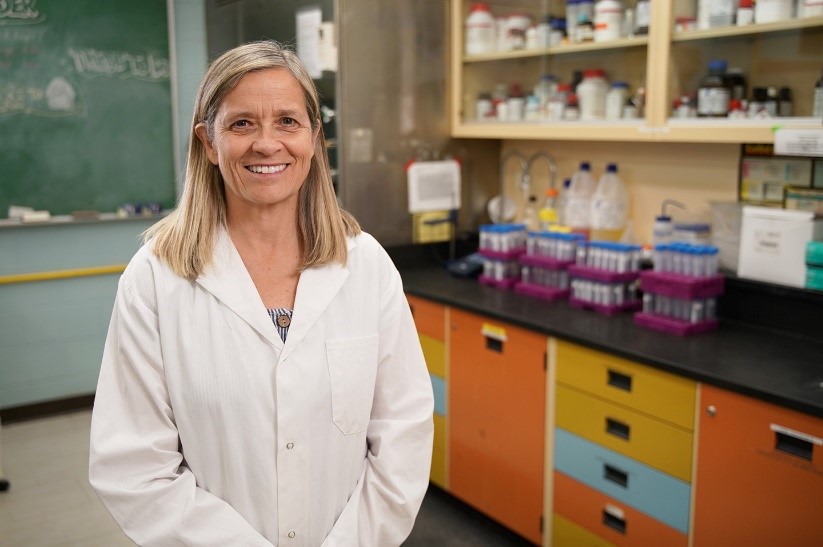No one dreams about a career studying cow burps. But when you’re Dr. Karen Beauchemin, research scientist with Agriculture and Agri-Food Canada’s (AAFC) Lethbridge Research and Development Centre, you know that there’s more to bovine belches than meets the nose. It’s this unique perspective on science and an insatiable curiosity that led her to becoming one of the world’s leading experts on livestock methane emissions. However, her 30-year career advancing the science of animal production to help the environment had some unexpected twists along the way. In fact, she didn’t even know her true calling until she got to AAFC.

Life is curious
Born in Montreal and raised in the Maritimes, Karen’s interest in nutrition began at a young age. Her aptitude for science leant to her greater curiosity about the world, particularly when it came to food: “I was always interested in food production and what makes food nutritious.”
Having not grown up on a farm, a career in agriculture wasn’t intuitively the answer for Karen. But working on farms and in the feed industry, combined with an education focused on nutrition and agriculture, including a PhD from the University of Guelph, gave her the knowledge base and confidence to pursue a career in animal nutrition.
When she joined AAFC as a researcher at the Lethbridge Research Center in Alberta, it was the perfect opportunity to follow her passion for agriculture. She spent many years working on the nutrition of dairy and beef cattle to improve the quality of meat and milk for consumers. But as she continued on with her career, she began to wonder about the wider impacts of farming on the environment.
“Animal nutrition was my specialty,” she recalls. “But after a few years, I started thinking about the effects of livestock farming on the environment.” With that thought in mind, she began to see cattle and their burps in a whole new light.

The matter of methane
One area of farming that didn’t receive a lot of attention was the impact of greenhouse gas emissions. While fossil fuels make up the greatest portion of greenhouse gas emissions, Karen knew there was an area being overlooked: enteric methane emissions from livestock.
Currently, enteric methane emissions from livestock make up 3.3% of Canada’s overall greenhouse gas contribution, relatively small compared to the 80% contribution of carbon dioxide from burning fossil fuels. But, as Karen points out, “every little bit helps when it comes to reducing greenhouse gases.”
Exiting Enteric Methane
Methane is a potent greenhouse gas that is produced by livestock such as cows, sheep and goats. Known as ruminant animals, or hoofed plant eaters, they have a multiple-compartment stomach that produces enteric, or intestinal, methane during the digestion process. When the animal eats fibrous foods, microbes digest the material in its fore-stomach (otherwise known as the rumen). Enteric methane is a by-product of this digestion and is released into the atmosphere via the breath—mostly by belching.
With that in mind, Karen and her research team got to work. They developed climate controlled rooms designed to measure methane emissions from cattle and sheep fed an assortment of feeds. By changing the animal’s diet, they could see firsthand how it affected methane production. Those studies led the team to develop different diets to decrease methane emissions. This innovative research gave Karen’s work international recognition. She has since acted as an expert voice on livestock farming in the media and has even shared her research with the International Panel on Climate Change.
However, Karen has learned that when it comes to communicating her research with a wider audience, the message can sometimes get lost in translation.
A future of efficiency
The impact of cattle farming on greenhouse gases and the potential to reduce methane emissions, “is not a simple story,” Karen says.
It’s easy to get confused by the complexity of the issue, especially when it comes to human diets that are best for the planet. Greenhouse gases are only one part of assessing environmental sustainability. For example, although cattle generate methane, they also produce a quality source of protein for human consumption, and their diets consist of grass and by-products from the food industry that would otherwise go unused. Also, beef and dairy farms provide other ecological benefits, such as conserving biodiversity, enhancing soil carbon storage and health, improving water quality, and providing habitat for wildlife.
Food production is a tricky subject to navigate, and researchers like Karen work to provide scientifically valid data to inform food choices. Every bite of food impacts the environment, and Karen wants to help Canadians eat wisely.
As she approaches retirement in 2022, Karen sees a bright future for livestock farming in Canada. “We’ll see more emphasis on environmental considerations, with cattle farming becoming more efficient and sustainable,” she predicts.
New technologies and improved management will continue to increase the efficiency of meat and milk production, while decreasing environmental impacts. This includes Karen and her team’s work to reduce methane emissions by improving animal diets. They have already seen a 30% reduction in methane emissions with some diet changes. Researchers are looking at many innovative solutions to limit emissions, even the idea of feeding seaweed to cattle!
One thing is certain: there isn’t a single, miraculous solution for reducing methane emissions from livestock farming. It’s a group effort, one that requires input from farmers and researchers alike. But Karen is optimistic. “Every day, we learn a little bit more,” she says. “Every day, we’re helping.”
For more on Karen’s work, you can catch her interviews on the Cows on the Planet podcast or AAFC’s Fields of Science series.
Get more Agri-info
- Want more stories like this? Explore what else Agri-info has to offer.
- Interested in reporting on this story? Contact AAFC Media Relations at aafc.mediarelations-relationsmedias.aac@agr.gc.ca to arrange an interview with one of our experts.